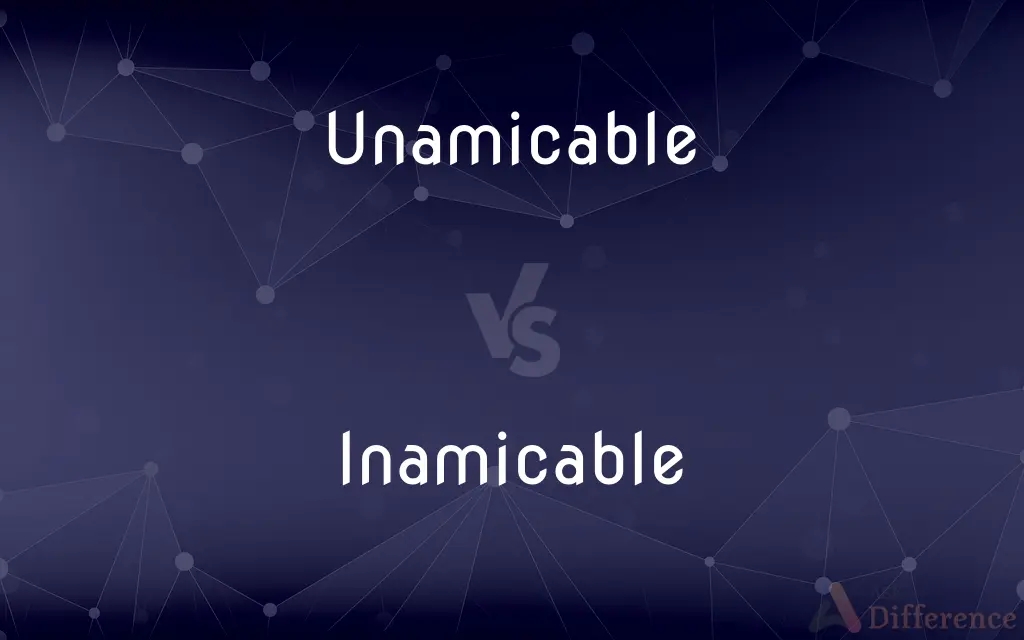Unamicable vs. Inamicable — What's the Difference?
By Maham Liaqat & Fiza Rafique — Updated on April 8, 2024
Unamicable refers to a lack of friendliness or goodwill, often implying hostility or disagreement, whereas inamicable, less commonly used, carries a similar meaning of not being amicable or friendly.

Difference Between Unamicable and Inamicable
Table of Contents
ADVERTISEMENT
Key Differences
Unamicable often describes relationships, negotiations, or situations characterized by a distinct lack of warmth or cordiality. It suggests the presence of underlying tensions or outright hostility. Whereas, inamicable, though bearing a similar meaning, is less frequently encountered in everyday language and might be used in more formal or specific contexts to denote an absence of amicability or friendliness.
Unamicable interactions are typically marked by an evident discord or conflict, making any sort of agreement or cooperation difficult to achieve. On the other hand, inamicable situations, while also highlighting a lack of friendly relations, can imply a more passive absence of warmth rather than active hostility.
In the context of disputes or disagreements, an unamicable split refers to a separation where the parties involved are openly antagonistic or contentious. Conversely, an inamicable disagreement might not only lack friendliness but could also suggest a more subtle or understated form of discord, not necessarily characterized by overt conflict.
The term unamicable is often used in legal or formal contexts to describe proceedings or negotiations that are fraught with disagreement and lack of consensus. In contrast, inamicable might be employed in similar contexts but could also be found in discussions of international relations or diplomatic affairs, emphasizing the absence of cooperative spirit or goodwill.
In popular usage, unamicable captures the essence of relationships or interactions that have soured, emphasizing a breakdown in communication or cooperation. Inamicable, while also describing relationships lacking in friendliness, tends to be used in more nuanced discussions where the focus is on the absence of a positive connection rather than the presence of a negative one.
ADVERTISEMENT
Comparison Chart
Definition
Lacking friendliness or goodwill, often with hostility.
Lacking amicability or friendliness, not commonly used.
Usage Frequency
More commonly used in everyday language.
Less common, more formal or specific contexts.
Implication
Suggests active hostility or conflict.
Implies a passive absence of warmth or friendliness.
Typical Contexts
Legal disputes, personal relationships, negotiations.
Formal discussions, diplomatic relations, academic texts.
Underlying Connotation
Emphasizes overt discord or contention.
Highlights a subtle or understated lack of friendliness.
Compare with Definitions
Unamicable
Characterized by a lack of cooperation.
Their unamicable divorce process dragged on for years.
Inamicable
Not conducive to friendly relations.
The inamicable tone of the letter soured their partnership.
Unamicable
Marked by hostility.
The debate turned unamicable, with participants exchanging heated words.
Inamicable
Not characterized by amicability or warmth.
The discussions were inamicable, lacking any real progress.
Unamicable
Indicative of a sour or bitter relationship.
Their once-close friendship had become distinctly unamicable.
Inamicable
Absence of a positive or cooperative spirit.
The inamicable response was not what they had hoped for.
Unamicable
Not friendly or amiable.
The meeting ended in an unamicable manner, with both parties refusing to compromise.
Inamicable
Lacking friendliness in interaction.
His inamicable demeanor made negotiations difficult.
Unamicable
Showing no goodwill.
Despite the unamicable atmosphere, they managed to reach a temporary agreement.
Inamicable
Denoting a formal or cold lack of amity.
Their relationship turned inamicable after the disagreement.
Unamicable
Not amicable
Inamicable
Not amicable; unfriendly or hostile.
The children suffered through their parents' inamicable divorce.
The peace talks became inamicable and the participants fired insults at each other.
Common Curiosities
How is inamicable different from unamicable?
While both terms denote a lack of amicability or friendliness, inamicable is less commonly used and may imply a more subtle or formal lack of warmth.
Can negotiations be unamicable?
Yes, negotiations can be unamicable if they are marked by a lack of agreement, cooperation, and overt conflict or hostility.
Can a friendship become unamicable?
Yes, friendships can become unamicable due to unresolved conflicts, betrayals, or significant changes in values or life paths.
Why would a negotiation turn inamicable?
Negotiations might turn inamicable due to conflicting interests, lack of willingness to compromise, or personal animosities between the parties involved.
Can a divorce be unamicable?
Yes, a divorce can be described as unamicable when it involves significant hostility, contention, and lack of cooperation between the parties.
Is inamicable a common term?
Inamicable is less common and might be used in more formal or specific contexts than unamicable, which is more frequently encountered in everyday language.
What does unamicable mean?
Unamicable describes a situation, relationship, or interaction that lacks friendliness or goodwill, often marked by hostility or conflict.
How does one handle an unamicable situation?
Handling an unamicable situation often requires patience, clear communication, and sometimes mediation to address underlying issues and conflicts.
What are the signs of an unamicable divorce?
Signs of an unamicable divorce include prolonged legal battles, public disputes, and an inability to reach mutual agreements or compromises.
How do you describe an unamicable meeting?
An unamicable meeting is characterized by tension, disagreement, and a noticeable lack of constructive dialogue or mutual respect.
What kind of relationships are described as inamicable?
Inamicable relationships are those that lack warmth and friendliness, often in a more subtle or passive manner than those described as unamicable.
Is it possible for a workplace to be inamicable?
Yes, a workplace can be described as inamicable if it lacks a friendly atmosphere, possibly affecting morale and productivity.
Can international relations be inamicable?
Yes, international relations can be described as inamicable when countries lack cooperative spirit or goodwill towards each other, often impacting diplomatic efforts.
How to improve an inamicable relationship?
Improving an inamicable relationship might involve open dialogue, empathy, understanding the other’s perspective, and efforts to rebuild trust and warmth.
Is it common for business partnerships to be inamicable?
While not ideal, business partnerships can become inamicable, often due to disagreements on operational, financial, or strategic decisions.
Share Your Discovery

Previous Comparison
Deduce vs. Induce
Next Comparison
Ice vs. RockAuthor Spotlight
Written by
Maham LiaqatCo-written by
Fiza RafiqueFiza Rafique is a skilled content writer at AskDifference.com, where she meticulously refines and enhances written pieces. Drawing from her vast editorial expertise, Fiza ensures clarity, accuracy, and precision in every article. Passionate about language, she continually seeks to elevate the quality of content for readers worldwide.
















































